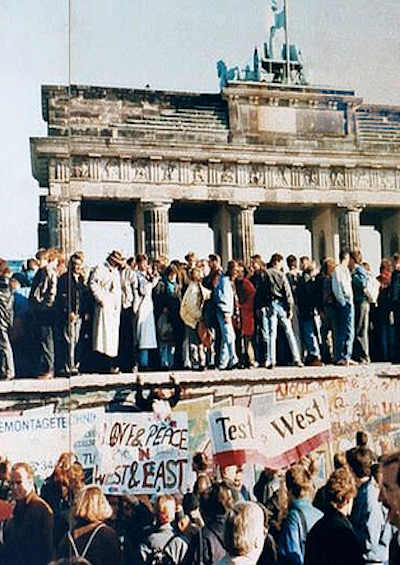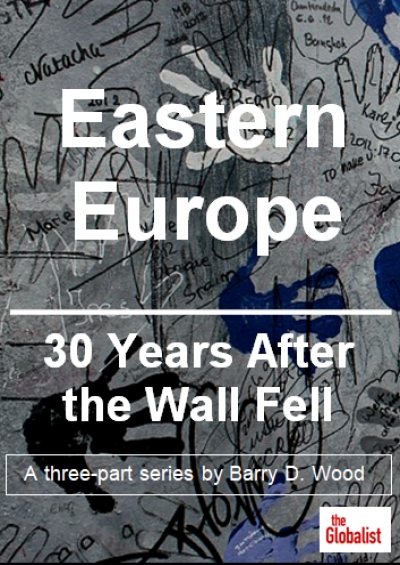Freedom Reborn: Witnessing German Reunification
The fall of the Berlin Wall signaled a rebirth of freedom, liberating millions who had been trapped for two generations on the wrong side of the Iron Curtain.
November 9, 2019

In late March 1990 when there was still a communist East Germany, I spent ten days traveling from East Berlin to Leipzig, Dresden and places in between.
One dreary evening I arrived late in historic Weimar only to find the hotels fully booked. But in a makeshift office near the station an enterprising easterner had set up an agency that paired travelers with locals seeking hard currency putting up strangers in their homes.
After a couple of phone calls, the young man handed me the coordinates of Beate Hofmann, who soon drove up in a grey Trabant and whisked me off to her nearby home. This was East Germany’s sharing economy before Airbnb.
It was wonderful being hosted by an engaging school teacher who seemed simultaneously thrilled and terrified by the immense changes underway in the German Democratic Republic.
Offering me a beer, we sat in her kitchen and chatted about current events. Suddenly she got up, rushed to another room and returned with Mikhail Gorbachev’s Perestroika, New thinking for our Country and the World. “Here is the man!” she exclaimed, pointing to the Soviet leader’s picture on the book’s cover.
Beate Hofmann in her kitchen, March 1990

Not a single shot fired
Beate was spot on. By allowing the wall to be breached on November 9th, Gorbachev had set in motion the liberation of all of Communist Eastern Europe. Anthony Robinson wrote in the Financial Times, “all of Stalin’s wartime gains were given up without a shot being fired.”
Later, reflecting on German unification, Gorbachev put the blame for East Germany’s demise on its superannuated Communist leader Erich Honecker, saying he had been warned the previous June that “he who is late loses.”
Honecker said Gorbachev failed to implement openness and restructuring, reforms that might have preserved East Germany and forestalling its merger into West Germany. Two years later Gorbachev himself would be swept away by the changes he had unleashed.
Change at breakneck speed
Moving through the country, it seemed East Germans were devouring every piece of reading material they could get their hands on.
Change was happening at breakneck speed. In mid-March they had voted in their first ever free election and threw out the Communists who had ruled with an iron fist for 44 years. Unification appeared inevitable — and it occurred in October 1990.
Transiting Bitterfeld, East Germany’s “chemical city,” our train was enveloped by smog as we passed chemical plants belching out noxious smoke. So dense was the smog it was difficult to make out the contours of buildings from the train window.
The malodorous smell persisted, prompting thoughts of Blake’s “dark satanic mills” in 18th century England.
In Potsdam, an East Berlin suburb, I encountered a squad of Soviet soldiers returning to barracks from Saturday morning shopping. Startled as they swept past in their great coats and high leather boots, I wondered what would happen to them after unification.
Red army soldiers returning from shopping, Potsdam, March 1990

In retrospect, it seems incredible that unification and the prompt withdrawal of Soviet troops actually took place. Historians credit three men—Gorbachev, Chancellor Helmut Kohl and George H.W. Bush—for the momentous achievement.
Germany in NATO
Because there was no consensus among the western powers, the Americans were decisive in persuading Gorbachev that a unified Germany inside NATO was the best guarantee of stability in central Europe.
The French and British were initially reluctant, fearful of the larger, unified Germany within the European Union. Prime Minister Margaret Thatcher had said, “we beat the Germans twice and now they’re back.” And in Moscow, two months before the wall came down, she told Gorbachev, “we do not want a united Germany. That would lead to change in postwar borders and we cannot allow that.”
Aware he was playing a weak hand, France’s Francois Mitterrand pressed Kohl on European monetary union, winning a German commitment to abandon the Deutschmark and move towards adoption of what became the euro currency.
In those heady, days the cold war ended. Hope, brotherhood and peace were the watchwords.
Economist Milton Friedman was among those finding deeper meaning in the opening of the wall. It was, he told a C-SPAN audience in 1994, the end of socialist ideology.
The collapse of the Berlin Wall, he said, “is the most significant action of the last 100 years,” — dispelling the notion that government can solve problems.
Economics aside, the opening of the wall signaled a rebirth of freedom, liberating millions in over a dozen countries who had been trapped for two generations on the wrong side of the iron curtain.
Barry Wood at the Berlin Wall, March 1990

Takeaways
In late March 1990, I spent ten days traveling from East Berlin to Leipzig, Dresden and places in between.
The fall of the Berlin Wall signaled a rebirth of freedom, liberating millions who had been trapped for two generations on the wrong side of the Iron Curtain.
In those heady, days the cold war ended. Hope, brotherhood and peace were the watchwords.
